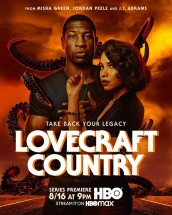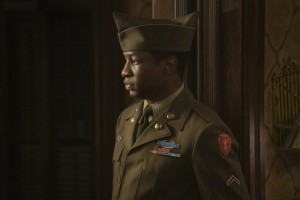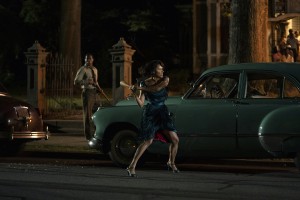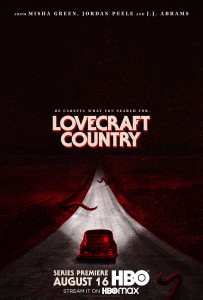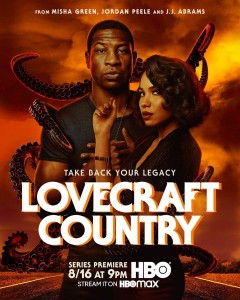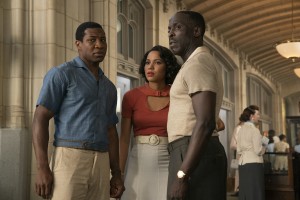
Jonathan Majors, Jurnee Smollett, Michael K. Williams in LOVECRAFT COUNTRY – Season 1 | ©2020 HBO/Eli Joshua Ade/HBO
LOVECRAFT COUNTRY, now in its first season Sunday nights on HBO, is one of the wildest rides ever through the Midwest and Northeast of the United States during the 1950s. Based on the novel by Matt Ruff, LOVECRAFT COUNTRY has been adapted for television by executive producer/show runner Misha Green. The show follows Black U.S. Army veteran Atticus “Tic” Freeman, played by Jonathan Majors, who returns home to Chicago to find that his father, Montrose (Michael Kenneth Williams), has mysteriously disappeared somewhere in New England. Tic sets out to find his father, accompanied by his childhood friend Letitia “Leti” Lewis, played by Jurnee Smollett, and his uncle George (Courtney B. Vance).
The trio encounter horrendous racism, along with actual monsters, magic users, and cultists who might have come from the pages of the work of H.P. Lovecraft. Ironically, although George and Tic are big Lovecraft fans, they’re aware the writer was a virulent racist himself.
Green’s vision of LOVECRAFT COUNTRY sometimes uses modern music to make a point, including the inclusion of “Movin’ On Up,” the theme song from THE JEFFERSONS, when Leti and George briefly get to enjoy themselves in mansion suites that anticipate their every desire. Smollett in UNDERGROUND, the drama about the pre-Civil War Underground Railroad, which Green co-created.
COVID-19 has dictated that the Television Critics Association Summer 2020 press tour takes place entirely online. This article is derived from the LOVECRAFT COUNTRY online panel. Green, Majors, and Smollett each appear from their respective homes, answering questions from the press.
Green addresses how fantasy horror and real-world monstrosity coexist in LOVECRAFT COUNTRY. “I think that the monsters are a metaphor for the racism that’s always been through America and even globally. For me, genre works best when it is the metaphor on top of the real-life emotions that you explore in the real-life problems. And I think that that was one of the things that was exciting to me about Matt Ruff’s book, is that he blended that very well, and we wanted to really honor that as we did the TV series.”
“In my opinion,” Majors elaborates, “a monster is a monster. A monster is something that is driven by an inside system, right? And that system is to terrorize or destroy and there’s no compromising with it, and that’s interesting. When it’s a feral dog, for instance, where the dog is being told by its internals to attack, bite, kill, et cetera. It’s quite different when that monster is disguised in the same body as you and the only thing that’s different is the skin color, right? That then makes it more for me a mental and psychological f**k. You’re completely confused in many ways and that confusion leads to distress, and that distress gets your adrenalin, gets your adrenals all up. Then, all of a sudden, you’re in a horror film. So I would say, for me, the white racists, or racists in general, are extremely that much more terrifying than the Shoggoths or Cthulhu, et cetera.”
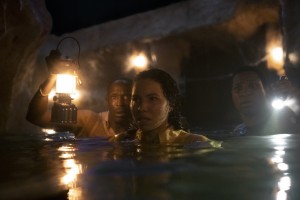
Michael K. Williams, Jurnee Smollett, Jonathan Majors in LOVECRAFT COUNTRY – Season 1 | ©2020 HBO/Eli Joshua Ade/HBO
Smollett says, “I would add to that, granted, what we explore in the show is how with a monster, you know what you get, right? If you see a Shoggoth, you kind of know what you’re up against. The unfortunate thing about the almost spiritual warfare that our characters are engaged with in bringing down the racism is that you don’t really know where it’s coming from. And that is sometimes even more of a threat because it’s unexpected, and it affects your livelihood, and it affects you on every single level. It affects your pursuit of happiness, your pursuit of joy, your pursuit of family trying to live in a neighborhood that is all white, the isolation, the loneliness, but, also, the trauma that you experience on so many levels in that in being Black and American; the displacement when you realize that America’s not evolved a place for you. So the attacks come on every level from racists, right? With a monster, you’ve just got to outrun it.”
“Yeah,” Majors affirms. “with a monster, it’s a direct physical threat. You know, they want to eat you. Run faster.”
Smollett laughs. “Run faster, that’s what you say.”
The human racists are definitely meant to be comparable to the unearthly monsters. Green points out that, unlike the depiction of many racists, all the ones we see in LOVECRAFT COUNTRY are in the Northern U.S. “Our show does not take place in the South. It’s all in the North, which was one of the things when reading the book that really struck me. Immediately, you think of Jim Crow South, but Jim Crow was everywhere at the time, and that it was really important that it was clear for us that the show was taking place in the North and understand that this was a problem all across America. And, yes, we definitely talked a lot about putting them on the same plane as the monsters. The fact, even in the pilot, that you might even be relieved when the Shoggoth actually shows up, because you’re like, ‘Wow.’ That parallel was very clear for us and we were very adamant about making sure that we kept that throughout the season.”
What does adding actual fanged, slathering monsters do for the discussion of racism? “It’s great,” Green replies. “I love monsters. I’ve been a horror fan since I was a kid. So, it was just going into that whole realm and creating these CGI monsters and finding that was exciting and fun. And for me, again, the genre works best when metaphor is on top of something real, so it felt really prescient here and what Matt Ruff had done in his book to parallel how the monsters from pulp was the metaphor on top of the racism that was going on in America, and it’s still going on.”
How did Green find the tone she wanted for LOVECRAFT COUNTRY? “Finding the tone was really simple. I feel like on UNDERGROUND, me and my co-creator, Joe Pokaski, found this space of blending a heist movie with slavery times. So, for me, it was easy to get that tone to ride that line, and then to bring in sound footage and sound audio as source for the soundtrack, and that’s what we did a lot with the story voiceover from the beginning of that movie. So the tone was easy to find, I think, because I had had that experience with UNDERGROUND and blending genre with something that was historical.”
As for using contemporary music to score the past, Green relates, “I think that it was another thing that we found that really worked well on UNDERGROUND, was this idea of using modern music to bridge time, to take kind of a period piece off the wall, and it’s not a portrait anymore that you’re stepping into. You’re bringing it here to the ground with us today, and music is a great bridge of time. So, for me, that was just another thing that I knew I was going to bring to this project as well, and it’s just so fun to play some Cardi B in1950 and have it resonate just as much as it does today.”
“Hell, yeah,” Majors agrees.
LOVECRAFT COUNTRY clearly has a bigger budget than Green’s previous series UNDERGROUND. What changes about making a television show with more money, and what stays the same regardless?
Green replies, “I think that one episode of this show [has the budget of] maybe five of UNDERGROUND. One of the biggest differences in terms of having a large budget, the playground you can play in is incredible. On this show, by the end of the day, our production designer said we had 162 sets. That’s bananas. I think the same with the visual effects. It’s like the VFX houses we’ve been working with, the makeup special effects places we work with, KNB, they’re one of the biggest. So for that, the difference was there was no limit to my imagination, which was fantastic. When I pitched to HBO, I said, ‘This is going to be big and epic and crazy. And we’re going to go there.’ And they were like, ‘Cool, yeah, we totally want to do that.’ And then we got halfway in and they were like, ‘This is big.’ And I was like, ‘Yep. And we’re going to keep going now. No turning back.’ So, it was just incredibly exciting and fun. And then you see the opportunities at this level and you wish that everyone could have these on every movie because it’s so helpful.”
Majors and Williams play son and father in LOVECRAFT COUNTRY. In the 2017 miniseries WHEN WE RISE, they had played younger and older versions of the same person, pastor and gay rights activist Ken Jones. Did the experience of sharing a character with Williams help Majors play their familial relationship in the new HBO series?
“Yeah,” Majors responds. “First off, Michael, that’s my man. And the bonding we had on WHEN WE RISE, the fact that we were playing the same guy at different ages, there’s something to that, I think. And then for Misha and the rest of the squad to put us together as father and son now, we had already built the off-set relationship. That brotherhood, paternal/fraternal, the resistance was already there. And then we developed it and curated it a bit more to play father and son. But, yeah, absolutely, when Atticus and Montrose met, we were halfway there already.”
Majors says his theater training helps him act opposite LOVECRAFT COUNTRY’s monsters, which are sometimes added in post-production via CGI. “Dealing with monsters and ghosts and those things is kind of an actor’s dream. In the theater, you’re dealing with the fourth wall, you’re dealing with imaginary circumstances in both mediums, but the imagination was key. It’s very much like, I think, Leti and Atticus could be the Scottish king and queen, ‘Is this a dagger I see before me?’, all these images that are being projected in my head. So playing with actual monsters and green guys and green gals in monster costumes was quite interesting. And it felt very much like a theater game, in some cases, but in others, just the applying of the imagination in that way.”
Smollett is an activist in real life; in LOVECRAFT COUNTRY, Leti begins working towards a better quality of life for herself and the Black community. How does Smollett view the show’s depiction of racial inequality in the ‘50s? “In preparation for this, it definitely required a lot of research and was quite sobering to see the parallels [to the present]. The fact that the systemic racism that this nation’s been built upon has yet to be dismantled is very much [something] I could relate to so many instances in the text. You look at something that happens during this period, like an Emmett Till, and you see a Trayvon Martin. And really, the story is so ancestral. Our heroes essentially are going on a quest to bring down white supremacy, and we are still on that quest today in 2020 as Black Americans; because racism is such a demonic spirit, it’s something that we are still fighting off. But one thing I love so much about the research process was going back to writings like James Baldwin, or Gwendolyn Brooks or these great minds and thinkers like Lorraine Hansberry, and there’s such wisdom and knowledge that they provided then that we can gain from now. And it’s humbling.”
Some of the material in LOVECRAFT COUNTRY is extremely disturbing. How did the cast deal with this? Majors says, “There are some very dark passages in the piece. I think that’s so neat, because that’s so real. The experience, I think, of any cultural group, if you look deep into it, they have dark passages. We know historically that [there are] dark passages of the African-American or the African diaspora. So the things we reference, the things we experience in the story, are things that happen in the day-to-day life. It’s in the DNA of the African American experience.”
How did everyone keep from getting overwhelmed? “For me,” Majors responds, “it was the cast. It was the fact that we once we were done with the scene, with the dark passage, we just moved through it, you know? That was the thing. I mean, we shot this in eight months. So we moved through the light into the dark, but we never stopped. So, it was very much the experience of our ancestors, you know, and our predecessors.”
Smollett agrees. “It’s so true what you say. It reminds me of something that I talk about sometimes, what my teacher talks about, is this idea of blood memory, this visceral ancestral connection to the impression of our people. And so you for sure could feel that in moments on a molecular level, the vibrations in certain scenes and stuff like that. But I agree that we held on to each other and there was such a trust and such a bond with each other. You know, I don’t know if I would have survived without the fist bumps, Jonathan.”
“Fist bumps, yeah,” says Majors. “There were so many rituals on set. It was like things that just reminded us that, yes, we were in this together. For instance, I think what was maybe the first day, it was Misha, Jurnee and myself, just us on set. I wish I could go grab mine, but we found these little toy soldier toys, you know. And we just kept them. Each one of us have one. And that was just a moment of like, ‘This is the team.’ Me and Misha had a phrase, ‘Six months till glory.’ It ended up being eight months till glory. Literally, no matter who was shooting first, Jurnee and I would meet outside trailers, chat inside trailers, talk about the day, do our little thing. Send up our prayer, you know and go to work. That happened every day. And then we had fist bumps between, which got a little …”
“Got a little controversial,” Smollett observes.
“But,” Majors elaborates, “lots of rituals to keep us together and keep us grounded, because it was a high, it’s a high-stakes type of show emotionally and physically, and spiritually.”
In Ruff’s novel, Tic’s young cousin, Uncle George’s child, is a boy named Horace. In the TV version, Uncle George and his wife Hippolyta (Aunjanue Ellis) have a little girl, Diana, played by Jada Harris. Why was this change made?
Green explains, “In our writers’ room, we talked a lot about each character and where we could go with them across the ten episodes. We wanted to make sure that we were honoring the book and using it as the beautiful platform it was, but that we weren’t afraid to go to different places. And as we were talking a lot about black children in America and what they’re going through, and the constant terror they’re under, we really started to get into this idea of the hashtag #SayHerName. We were interested in exploring what that looks like for young black girls and really putting that story up on its feet. Later in the season, you’ll see that we kind of use A NIGHTMARE ON ELM STREET and Freddie Krueger to tell a story with Diana about what it’s like to be a young black girl in America and kind of the pervasive terror you’re always in because we felt like we really wanted to platform that story a little bit more.
The opening sequence in LOVECRAFT COUNTRY’s first episode is a fantastic mashup of creatures, 1928 warfare, visions and general mayhem. How did Green come up with this? “The conception of our kind of big, pulp monster dream in Atticus’s head, the idea is that I just wanted to come in big. I just wanted to go for it. I think that the series as a whole across ten episodes goes for it, and I just wanted to start that way and get introduced to this world with that feeling that you don’t know what’s about to happen. I think that that opening was laying the groundwork for where we were going using found audio, having aliens, having all these monsters, and then really setting up this idea is life is but a dream, and it’s in the way that magic is in this world. It’s like you can kind of use it to create what you want it be. And so that was all thematic, to the show as a whole. And you always want to start with a bang.”
What are some favorite episodes? Smollett answers, “Misha has this gift for maintaining varying degrees of tone, so we really got to explore a lot. It’s hard for me to pick because there were so many different colors and different ways we got to play. So, I can’t really pick one.” She asks Majors, “Can you?”
Majors responds, “Well, I would say I agree with everything you just said. It’s interesting because as you would read [the scripts], you would get so submerged into one genre, you have the tone for one genre, and you love that one, and then the next one you’ll be like, ‘Oh no, no, but this one. This is the dope one. This is where I’m supposed to be.’ You think you’ll be so submerged in that and then you would go on to the next one. It’s like, “Oh, now I see where we’re going. This is the one right here. We’re in water? Oh yeah, this is the one. This is the one. I love this one.’
Green says, “I do think Episode 4, the adventure episode, I think that’s the one we had the most fun, the most like ‘Okay, this is exciting to do.’
“Yeah, that one was a lot of fun,” Majors agrees.
“It was a lot of fun,” Smollett echoes. “I mean, it’s wild. Because it’s like LOVECRAFT really deconstructs the classic genres in so many ways, and then reimagines in such radical ways as well. I know we found ourselves like each time we would get a script, texting each other we would be like, ‘What! Did you read Episode 9?’”
Does Green feel that other projects helped make LOVECRAFT COUNTRY possible? “I think that it would have been incredibly hard to get this on air if GET OUT [written, directed, and produced by Jordan Peele, one of LOVECRAFT COUNTRY’s executive producers] hadn’t come out. I think that paved the way for people to really open up to the idea of seeing more Black people in dominant spaces. I think J.J. [Abrams, another executive producer on LOVECRAFT COUNTRY, with] LOST kind of paved the way for this bigger TV making, because I think the show is definitely an epic journey that wouldn’t have been possible if we weren’t making TV at the level that started with LOST and that pilot. And then every genre movie imaginable, and books, and all of that. We just went for everything in that space, from the adventure story to the horror story to sci-fi. So, we’d have every episode our syllabus of things we had to go through and watch: THE SHINING, AMITYVILLE HORROR, all of it. So it’s a huge influence. Everything in the genre space. I think that big genre fans will definitely see those Easter eggs and those homages throughout.”
Follow us on Twitter at ASSIGNMENT X
Like us on Facebook at ASSIGNMENT X
Article Source: Assignment X
Article: Interview with showrunner Misha Green and stars Jonathan Majors and Jurnee Smollett on Season 1 of the new HBO series LOVECRAFT COUNTRY
Related Posts:




